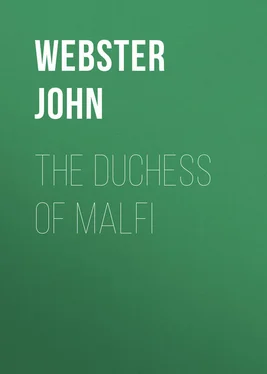John Webster - The Duchess of Malfi
Здесь есть возможность читать онлайн «John Webster - The Duchess of Malfi» — ознакомительный отрывок электронной книги совершенно бесплатно, а после прочтения отрывка купить полную версию. В некоторых случаях можно слушать аудио, скачать через торрент в формате fb2 и присутствует краткое содержание. Жанр: foreign_antique, foreign_prose, foreign_dramaturgy, на английском языке. Описание произведения, (предисловие) а так же отзывы посетителей доступны на портале библиотеки ЛибКат.
- Название:The Duchess of Malfi
- Автор:
- Жанр:
- Год:неизвестен
- ISBN:нет данных
- Рейтинг книги:5 / 5. Голосов: 1
-
Избранное:Добавить в избранное
- Отзывы:
-
Ваша оценка:
- 100
- 1
- 2
- 3
- 4
- 5
The Duchess of Malfi: краткое содержание, описание и аннотация
Предлагаем к чтению аннотацию, описание, краткое содержание или предисловие (зависит от того, что написал сам автор книги «The Duchess of Malfi»). Если вы не нашли необходимую информацию о книге — напишите в комментариях, мы постараемся отыскать её.
The Duchess of Malfi — читать онлайн ознакомительный отрывок
Ниже представлен текст книги, разбитый по страницам. Система сохранения места последней прочитанной страницы, позволяет с удобством читать онлайн бесплатно книгу «The Duchess of Malfi», без необходимости каждый раз заново искать на чём Вы остановились. Поставьте закладку, и сможете в любой момент перейти на страницу, на которой закончили чтение.
Интервал:
Закладка:
John Webster
The Duchess of Malfi
INTRODUCTORY NOTE
Of John Webster's life almost nothing is known. The dates 1580-1625 given for his birth and death are conjectural inferences, about which the best that can be said is that no known facts contradict them.
The first notice of Webster so far discovered shows that he was collaborating in the production of plays for the theatrical manager, Henslowe, in 1602, and of such collaboration he seems to have done a considerable amount. Four plays exist which he wrote alone, "The White Devil," "The Duchess of Malfi," "The Devil's Law-Case," and "Appius and Virginia."
"The Duchess of Malfi" was published in 1623, but the date of writing may have been as early as 1611. It is based on a story in Painter's "Palace of Pleasure," translated from the Italian novelist, Bandello; and it is entirely possible that it has a foundation in fact. In any case, it portrays with a terrible vividness one side of the court life of the Italian Renaissance; and its picture of the fierce quest of pleasure, the recklessness of crime, and the worldliness of the great princes of the Church finds only too ready corroboration in the annals of the time.
Webster's tragedies come toward the close of the great series of tragedies of blood and revenge, in which "The Spanish Tragedy" and "Hamlet" are landmarks, but before decadence can fairly be said to have set in. He, indeed, loads his scene with horrors almost past the point which modern taste can bear; but the intensity of his dramatic situations, and his superb power of flashing in a single line a light into the recesses of the human heart at the crises of supreme emotion, redeems him from mere sensationalism, and places his best things in the first rank of dramatic writing.
Dramatis Personae:
FERDINAND [Duke of Calabria].
CARDINAL [his brother].
ANTONIO [BOLOGNA, Steward of the Household to the Duchess].
DELIO [his friend].
DANIEL DE BOSOLA [Gentleman of the Horse to the Duchess].
[CASTRUCCIO, an old Lord].
MARQUIS OF PESCARA.
[COUNT] MALATESTI.
RODERIGO, ]
SILVIO,] [Lords].
GRISOLAN, ]
DOCTOR.
The Several Madmen.
DUCHESS [OF MALFI].
CARIOLA [her woman].
[JULIA, Castruccio's wife, and] the Cardinal's mistress.
[Old Lady].
Ladies, Three Young Children, Two Pilgrims, Executioners,
Court Officers, and Attendants.
ACT I
SCENE I 1 1 Malfi. The presence-chamber in the palace of the Duchess.
[Enter] ANTONIO and DELIO
DELIO. You are welcome to your country, dear Antonio;
You have been long in France, and you return
A very formal Frenchman in your habit:
How do you like the French court?
ANTONIO. I admire it:
In seeking to reduce both state and people
To a fix'd order, their judicious king
Begins at home; quits first his royal palace
Of flattering sycophants, of dissolute
And infamous persons, – which he sweetly terms
His master's master-piece, the work of heaven;
Considering duly that a prince's court
Is like a common fountain, whence should flow
Pure silver drops in general, but if 't chance
Some curs'd example poison 't near the head,
Death and diseases through the whole land spread.
And what is 't makes this blessed government
But a most provident council, who dare freely
Inform him the corruption of the times?
Though some o' the court hold it presumption
To instruct princes what they ought to do,
It is a noble duty to inform them
What they ought to foresee. 2 2 Prevent.
– Here comes Bosola,
The only court-gall; yet I observe his railing
Is not for simple love of piety:
Indeed, he rails at those things which he wants;
Would be as lecherous, covetous, or proud,
Bloody, or envious, as any man,
If he had means to be so. – Here's the cardinal.
[Enter CARDINAL and BOSOLA]
BOSOLA. I do haunt you still.
CARDINAL. So.
BOSOLA. I have done you better service than to be slighted thus.
Miserable age, where only the reward of doing well is the doing
of it!
CARDINAL. You enforce your merit too much.
BOSOLA. I fell into the galleys in your service: where, for two
years together, I wore two towels instead of a shirt, with a knot
on the shoulder, after the fashion of a Roman mantle. Slighted thus!
I will thrive some way. Black-birds fatten best in hard weather;
why not I in these dog-days?
CARDINAL. Would you could become honest!
BOSOLA. With all your divinity do but direct me the way to it.
I have known many travel far for it, and yet return as arrant knaves
as they went forth, because they carried themselves always along with
them. [Exit CARDINAL.] Are you gone? Some fellows, they say,
are possessed with the devil, but this great fellow were able
to possess the greatest devil, and make him worse.
ANTONIO. He hath denied thee some suit?
BOSOLA. He and his brother are like plum-trees that grow crooked
over standing-pools; they are rich and o'erladen with fruit, but none
but crows, pies, and caterpillars feed on them. Could I be one
of their flattering panders, I would hang on their ears like a
horseleech, till I were full, and then drop off. I pray, leave me.
Who would rely upon these miserable dependencies, in expectation
to be advanc'd to-morrow? What creature ever fed worse than hoping
Tantalus? Nor ever died any man more fearfully than he that hoped
for a pardon. There are rewards for hawks and dogs when they have
done us service; but for a soldier that hazards his limbs in a
battle, nothing but a kind of geometry is his last supportation.
DELIO. Geometry?
BOSOLA. Ay, to hang in a fair pair of slings, take his latter swing
in the world upon an honourable pair of crutches, from hospital
to hospital. Fare ye well, sir: and yet do not you scorn us;
for places in the court are but like beds in the hospital, where
this man's head lies at that man's foot, and so lower and lower.
[Exit.]
DELIO. I knew this fellow seven years in the galleys
For a notorious murder; and 'twas thought
The cardinal suborn'd it: he was releas'd
By the French general, Gaston de Foix,
When he recover'd Naples.
ANTONIO. 'Tis great pity
He should be thus neglected: I have heard
He 's very valiant. This foul melancholy
Will poison all his goodness; for, I 'll tell you,
If too immoderate sleep be truly said
To be an inward rust unto the soul,
If then doth follow want of action
Breeds all black malcontents; and their close rearing,
Like moths in cloth, do hurt for want of wearing.
SCENE II 3 3 The same.
ANTONIO, DELIO, [Enter SILVIO, CASTRUCCIO, JULIA, RODERIGO and GRISOLAN]
DELIO. The presence 'gins to fill: you promis'd me
To make me the partaker of the natures
Of some of your great courtiers.
ANTONIO. The lord cardinal's
And other strangers' that are now in court?
I shall. – Here comes the great Calabrian duke.
[Enter FERDINAND and Attendants]
FERDINAND. Who took the ring oftenest? 4 4 The reference is to the knightly sport of riding at the ring.
SILVIO. Antonio Bologna, my lord.
FERDINAND. Our sister duchess' great-master of her household?
Give him the jewel. – When shall we leave this sportive action,
and fall to action indeed?
CASTRUCCIO. Methinks, my lord, you should not desire to go to war
in person.
FERDINAND. Now for some gravity. – Why, my lord?
CASTRUCCIO. It is fitting a soldier arise to be a prince, but not
necessary a prince descend to be a captain.
FERDINAND. No?
CASTRUCCIO. No, my lord; he were far better do it by a deputy.
FERDINAND. Why should he not as well sleep or eat by a deputy?
This might take idle, offensive, and base office from him, whereas
the other deprives him of honour.
CASTRUCCIO. Believe my experience, that realm is never long in quiet
where the ruler is a soldier.
FERDINAND. Thou toldest me thy wife could not endure fighting.
CASTRUCCIO. True, my lord.
FERDINAND. And of a jest she broke of 5 5 At the expense of.
Интервал:
Закладка:
Похожие книги на «The Duchess of Malfi»
Представляем Вашему вниманию похожие книги на «The Duchess of Malfi» списком для выбора. Мы отобрали схожую по названию и смыслу литературу в надежде предоставить читателям больше вариантов отыскать новые, интересные, ещё непрочитанные произведения.
Обсуждение, отзывы о книге «The Duchess of Malfi» и просто собственные мнения читателей. Оставьте ваши комментарии, напишите, что Вы думаете о произведении, его смысле или главных героях. Укажите что конкретно понравилось, а что нет, и почему Вы так считаете.












